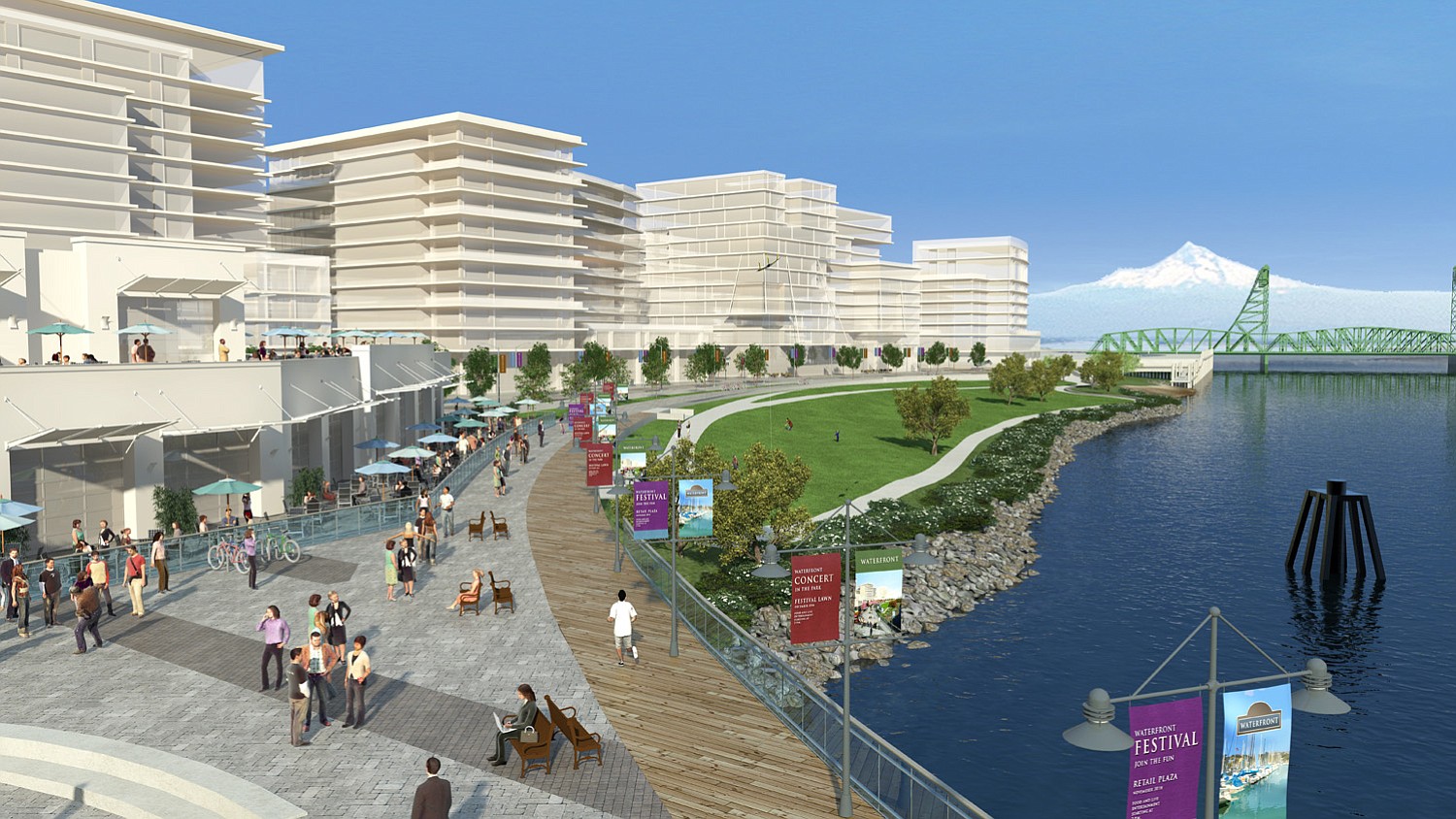Recent announcements of hotel and restaurant deals by the leader of a $1.3 billion commercial and residential redevelopment of Vancouver’s waterfront underscore the progress that’s being made on the long-planned project.
However, that momentum also raises a question: Is an oil-by-rail transfer terminal, proposed less than 2 miles west of the 32-acre waterfront site, far less of a threat to the waterfront project than its developer, Barry Cain, has described in his previous public statements?
The question arises after Cain, speaking during a panel discussion Thursday, said he’s inked a deal to build a 10-story hotel at the site and that it would begin construction in 2015. At least one restaurant has been signed and is expected to begin construction in 2015. A separate mixed-use building with retail, housing and office spaces also is in the works.
Previously, Cain, president of Tualatin, Ore.-based Gramor Development, has said the oil terminal would either kill or severely curtail what he’s described as a “world-class” waterfront project, including restaurants, up to 3,300 residential units, office space, retail space, a hotel and a public park. Cain has cited multiple safety and other concerns, including a spate of explosive oil-train derailments in the U.S. and Canada.
In a statement issued to The Columbian on Friday, Cain said the waterfront’s initial development won’t be as close to rail tracks as other phases. He also said he doubts the oil terminal — proposed by Tesoro Corp. and Savage Cos. to receive an average of 360,000 barrels of crude per day at the Port of Vancouver — will ever be built. He said it remains incompatible with the waterfront’s revitalization.
“We are proceeding with potential purchasers and tenants as we have planned all along,” Cain said. “The first blocks will all be waterfront development and not those closest to the rail lines.” He also said: “If the oil terminal gets approved at all, the eventual impact will be 660 rail cars a day, so this isn’t just about the waterfront future development, but other riverside and downtown opportunities. It’s our understanding that at current oil barrel prices, it’s not economically feasible to mine North Dakota oil now, anyway. It will be a contradiction to the beauty and the economic opportunities now underway at the waterfront.”
As to the waterfront project’s planned 7.3-acre park, Cain said “it’s our hope that we can proceed quickly with the park.”
In a Friday statement to The Columbian, Jared Larrabee, general manager of Vancouver Energy, the name of the Tesoro-Savage joint venture, said: “We are pleased to hear about the hotel agreement at the waterfront and believe this supports the perspective that both developments can bring needed growth and promote a vibrant Vancouver economy.” Larrabee also said: “The port has done a great job looking for ways to promote a range of economic development activities on each end of their property that spans over two miles.”
Both Cain and Tesoro-Savage have commissioned their own assessments of the oil terminal’s potential impacts on the waterfront project. Cain’s analysis, conducted by Portland-based Johnson Economics, says the oil terminal would “have a significant detrimental impact” on the waterfront site, “generating significant noise, visual impact and real and perceived risk associated with the explosive nature of the cargo.”
The Tesoro-Savage analysis, conducted by Seattle-based Heartland, says that “under reasonable market input assumptions,” the waterfront project “is not viable as conceived, making an argument about the impacts to value from the proposed terminal irrelevant.” The joint venture has said it will operate the oil terminal in a safe and environmentally sound manner.
Both Cain and Tesoro-Savage have submitted their analyses to the Washington State Energy Facility Site Evaluation Council, which is conducting a larger environmental impact examination of the oil terminal.
Eventually, the council will make a recommendation to Washington’s governor, who would approve or deny the oil terminal. Opponents may appeal the governor’s decision to the state Supreme Court.




